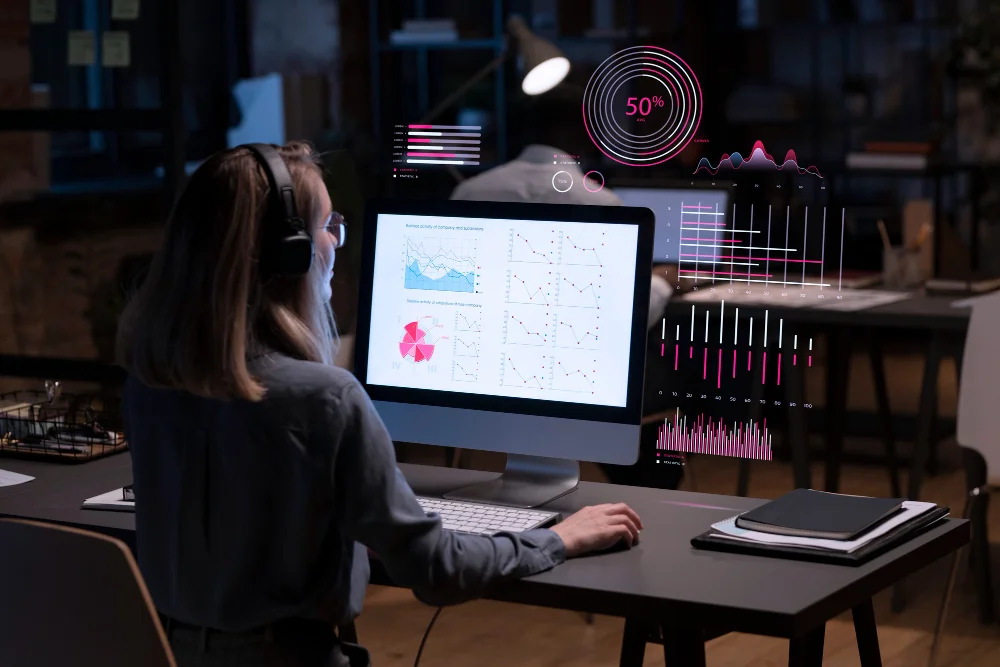Share Posts

Best Property Management Software 2025
46
3757
103
What is Property Management Software?
Property management software is a specialized software tool designed to streamline and automate various tasks involved in managing properties. It helps property owners, managers, real estate agents, and landlords easily manage all aspects of property-related operations.
It serves as a centralized platform for managing tenants, rent collection, and maintenance issues. This software can be customized to different types of properties, including residential, commercial, vacation rentals, and more.
It has replaced the traditional way of using pen-paper and manual spreadsheets to keep records. By improving business productivity, this management software helps you save time and reduce costs.
Developing software for property management helps manage multiple businesses across different industries at a time. Regardless of the type of property whether residential or commercial, this software is useful in many ways.
Why Invest in Property Management Software?
Let's delve into the compelling reasons why property management software is a strategic investment.
- The global property management software market, valued at USD 4,473.3 million in 2022, is projected to witness a significant compound annual growth rate (CAGR) of 8.1% from 2023 to 2030.
- As per the report by Fortune Business Insights, by 2030, the market size is anticipated to soar to an impressive USD 42.89 billion, marking a CAGR of 10%.
- Looking ahead, the global property management software market is expected to generate revenues of $2.6 billion by 2025. This underscores the financial viability of investing in property management software.
- According to some studies, 68% of property management companies are already leveraging property management software to streamline their operations.
- The property management industry in the United States alone boasts an annual revenue of $88 billion.
As revealed by recent statistics, the global property management software market is experiencing robust growth, and investing in such technology has become imperative for property managers and real estate professionals.
Property Management App
Property management app is a mobile application designed to provide a convenient and efficient way for property management. It offers a subset of the features you would find in the full software platform, designed for on-the-go management and communication.
Property management apps can do more than just help you communicate with your tenants. Whether it is collaboration, work order management, balance review, or other daily operations, it has all kinds of tools that can cover a range of functionalities, depending on their design and features.
Types of Property Management Software
Here we have listed down the five different types of property management software, each designed to meet the unique requirements of various real estate sectors.
Residential Property Management Software
Residential property management software is perfect for landlords, property managers, and homeowners who deal with residential properties. It includes features like tenant screening, rent collection, maintenance tracking, and lease management to simplify your day-to-day tasks and improve communication between property owners and tenants.
Commercial Property Management Software
If you're managing commercial properties like office buildings, retail spaces, or industrial facilities, then commercial property management software is the way to go. It helps you with lease administration, facility maintenance, and financial reporting so that you can streamline your operations, optimize lease performance, and maximize the return on investment for commercial property owners.
Hospitality Property Management Software
Hospitality property management software is specifically designed for hotels, resorts, and other lodging establishments. It includes features like reservation management, online booking systems, housekeeping coordination, and point-of-sale integration to improve operational efficiency.
Real Estate Asset Management Software
Real estate asset management software is geared towards investors, fund managers, and real estate professionals who oversee a portfolio of properties. It provides tools for portfolio analysis, performance tracking, risk management, and financial modeling, enabling stakeholders to make informed investment decisions and optimize the performance of their real estate assets.
Vacation Rental Management Software
Finally, if you're managing vacation rentals, then vacation rental management software is the perfect solution for you. It includes features like booking management, calendar synchronization, payment processing, and guest communication to streamline the rental process and ensure a seamless experience for property owners and guests alike.
Features of Property Management Software
Property Management Software (PMS) is equipped with a range of features designed to simplify the complexities of property management. Let's explore some essential features that make property management software an invaluable tool for property managers.
Tenant Portal
A Tenant Portal is a central feature of property management software that provides tenants with a secure online platform to interact with property managers and access essential information. Through the portal, tenants can submit maintenance requests, view lease details, make rent payments, and communicate with property management staff.
Accounting
Property management software includes robust accounting features that automate financial processes. From tracking income and expenses to generating financial reports, these tools simplify the accounting tasks associated with managing multiple properties.
Budgets and Rent Collection
This feature assists property managers in setting financial goals, tracking expenses, and ensuring financial stability. Additionally, integrated rent collection tools enable property managers to automate rent payments, issue invoices, and track payment histories.
Communication Tools
Communication tools often include messaging systems, automated notifications, and announcement features. Property managers can use these tools to communicate with tenants, owners, and maintenance staff efficiently.
Document Management
Document management features in property management software provide a centralized repository for storing and organizing important documents. Lease agreements, maintenance records, inspection reports, and other critical documents can be securely stored and easily accessed when needed.
Maintenance Management
Property managers can use maintenance management tools to receive and track maintenance requests, assign tasks to maintenance staff, and monitor progress. This proactive approach helps property managers address issues promptly, enhancing tenant satisfaction and property value.
Benefits of Property Management Software
Property Management Software (PMS) has emerged as a game-changing tool, offering numerous benefits that empower property managers to streamline their operations. Let's explore some of the key advantages that property management software brings to the forefront.
Multiple Property Management
Property managers dealing with diverse portfolios find PMS invaluable as it centralizes all property-related data, enabling efficient monitoring and management of various real estate assets in one place.
Automated Tasks
Property management involves a myriad of repetitive and time-consuming tasks, such as rent collection, lease renewals, and maintenance scheduling. Property management software automates these routine processes, significantly reducing manual effort and the risk of errors.
Streamlined Communication
PMS facilitates streamlined communication by providing tools such as messaging systems, automated notifications, and centralized document-sharing platforms.
Unlimited Channels
Property management software often integrates with various online channels and listing platforms. This feature allows property managers to expand their property listings across multiple channels simultaneously, reaching a broader audience.
Scalability
The scalability of property management software is a crucial advantage, particularly for growing property management businesses. Whether managing a handful of properties or an extensive portfolio, PMS is designed to scale alongside the business.
Data Storage and Protection
Property management software provides a secure and centralized data storage solution. Robust security features, including encryption and regular backups, protect sensitive data from unauthorized access and potential loss.
How to Build a Property Management Software?
Building property management software requires careful planning, strategic decision-making, and a thorough understanding of the industry's needs. Let’s take a look at the step-by-step process for creating robust property management software.
Define Goals
The development process begins by clearly defining the goals of your property management software. Find experienced developers who can work closely with you to understand your vision, objectives, and the specific outcomes you want to achieve.
Analyze the Market
The next step is to conduct thorough market research to understand the needs of property managers, landlords, and tenants. Also, it is essential to gain insights into current industry trends for creating a software solution that stands out in the market.
Decide on the Type of Property Management Software
Based on the gathered insights, choose the specific type of property management software you want to develop. Whether it is residential, commercial, or vacation rental management, you can customize your approach to meet specific market needs.
Determine the Core Features and Functionalities
The next step is to determine the core features and functionalities required for the property management software. Some of the essential features include tenant management, lease tracking, accounting, communication tools, and more.
Choose the Programming Languages and Technologies
Select suitable programming languages and technologies for building your software. This includes frontend technologies, backend frameworks, and databases that can help bring the envisioned software to life.
Build Wireframes and MVP
Before moving on to the designing part, it is important to develop wireframes that serve as blueprints for your software. Also, you can develop a Minimum Viable Product with basic features to get an idea of what your software may look like once it is developed.
UI/UX Design
With the help of highly skilled UI/UX designers, you can create an intuitive and visually appealing interface for your property management software. Before finalizing the design, make sure it aligns with industry standards and provides an ideal user experience.
Develop the Software
The development phase is where the software takes shape. Begin the development process based on the wireframes and MVP. Incorporate the agreed-upon features and functionalities to make the software scalable, secure, and able to handle the complexity of property management tasks.
Integrate Third-party APIs
If needed, integrate third-party APIs for functionalities such as payment processing, accounting, or communication tools to improve the software’s capabilities. All you have to keep in mind is that this integration should be done with precision.
Testing and Deployment
The final step before deploying the software product is to thoroughly test it. If any bugs or issues arise during software testing, address them immediately. Once everything is sorted out and the software is stable, deploy it to the chosen platform.
Best Property Management Software
Here is a list of the best property management software in the market.
Yardi Breeze
Buildium
AppFolio
TurboTenant
Propertyware
Rentec Direct
ResMan
DoorLoop
Rent Manager
Innago
What Makes Maticz The Best Property Management Software Development Company?
Maticz is the best property management software development company that stands as a beacon of innovation and excellence. We have a team of highly skilled developers and designers who are well-versed in delivering customized solutions tailored to the specific needs and objectives of our clients.
Being a leading Software development company, we employ an agile development methodology that involves iterative progress to make your software product quickly adapt to changes. Our dedicated support team ensures that any queries or issues are addressed promptly, and regular updates are implemented to keep the software at the forefront of industry standards. Talk to our experts today.
Tap Into the Future
The latest insights, posts, and project updates - straight to your inbox.




